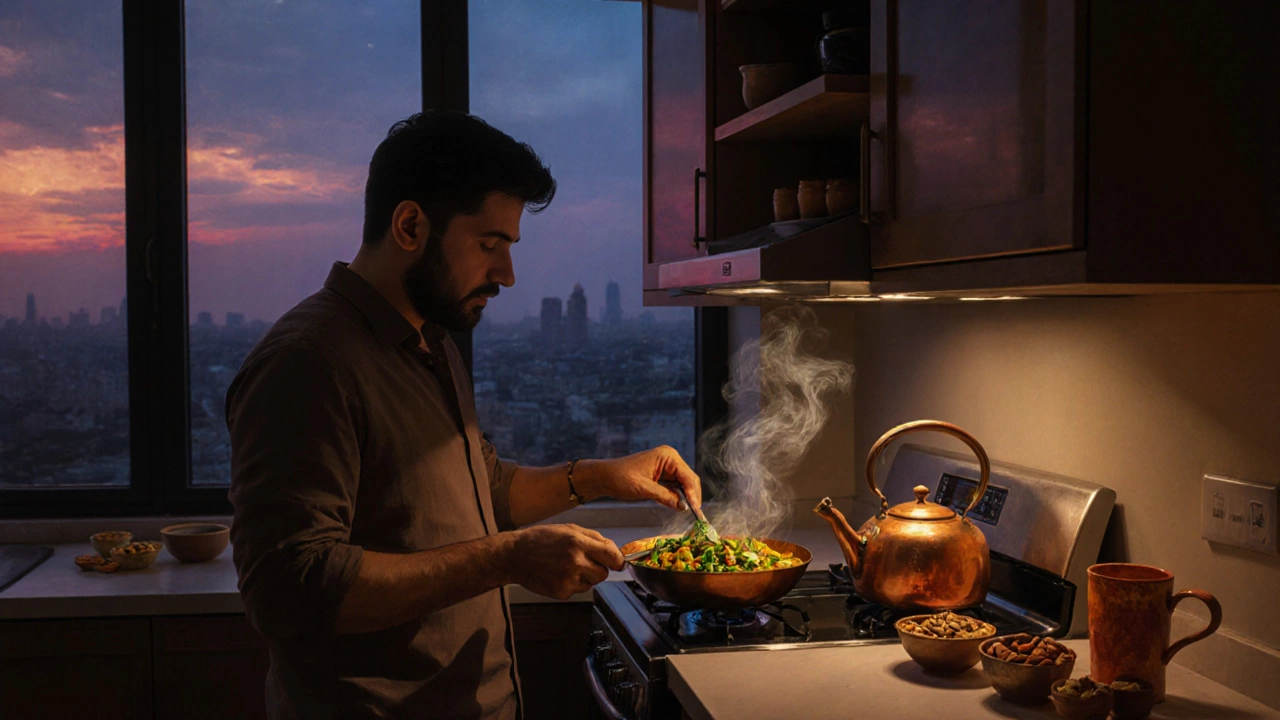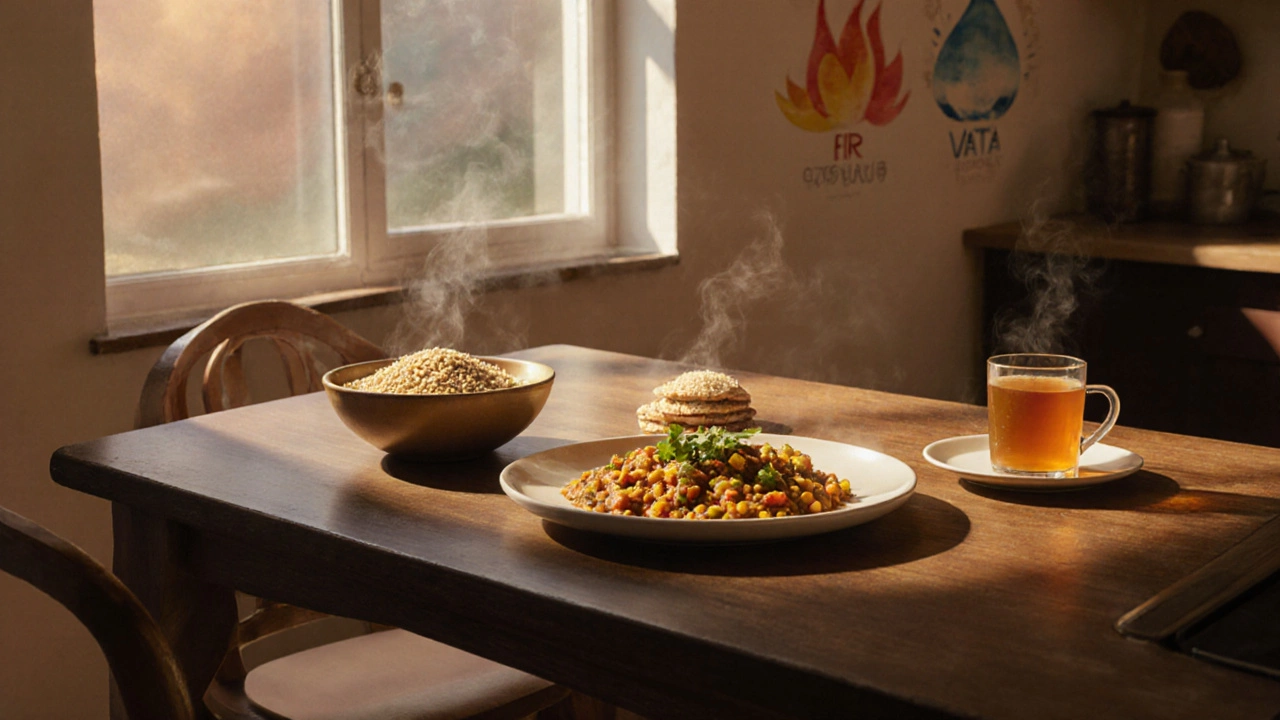Ayurvedic Dinner Time Calculator
Find Your Ideal Dinner Time
Ayurveda suggests eating dinner based on your dominant dosha (Kapha, Pitta, or Vata). Select your primary dosha to find your optimal dinner window.
Your Ideal Dinner Time Window
6am-10am
10am-2pm
2pm-6pm
6pm-10pm
10pm-2am
2am-6am
What to Eat
Key Tip
Ayurveda suggests eating dinner 2-3 hours before the next dosha's peak. The timing shown here is when your body will have optimal digestion for the meal.
When it comes to food, Ayurveda is an ancient Indian system of medicine that links diet, lifestyle, and the body’s natural rhythms. If you’ve ever wondered whether a late‑night plate is helping or hurting you, you’re not alone. In Ayurveda, the timing of meals is as important as the ingredients themselves because it directly affects Agni-the digestive fire that fuels every cell.
Why Dinner Timing matters in Ayurvedic theory
Ayurveda divides the 24‑hour day into three main intervals, each ruled by one of the three Dosha energies: Vata (air and ether), Pitta (fire and water), and Kapha (earth and water). Each dosha dominates a 4‑hour window when its qualities are strongest. Eating when a dosha is at peak can either enhance digestion or overload the system, leading to sluggishness, weight gain, or poor sleep.
Mapping the day: the three dosha windows
| Dosha | Time window | Ideal dinner period |
|---|---|---|
| Kapha | 6 am - 10 am | 5 pm - 7 pm |
| Pitta | 10 am - 2 pm | 7 pm - 8:30 pm |
| Vata | 2 pm - 6 pm | 8:30 pm - 10 pm |
The table shows a simple rule of thumb: eat dinner about 2‑3 hours before the next dosha’s peak. For most people whose dominant dosha is Kapha, that means finishing dinner by 7 pm. Pitta‑dominant types can push a little later, while Vata‑dominant folks benefit from an earlier, lighter meal.
How to identify your dominant dosha
- Physical build: Kapha types are sturdy and tend to gain weight easily; Pitta types have a medium build with strong metabolism; Vata types are lean and often feel chilly.
- Mental tendencies: Kapha = calm, steady; Pitta = sharp, competitive; Vata = creative, nervous.
- Digestive cues: Kapha digests slowly, Pitta digests quickly, Vata can be erratic.
Take a quick online questionnaire or consult an Ayurvedic practitioner to confirm your primary dosha. Knowing it helps you apply the dinner‑timing rule without guesswork.

Practical steps to align dinner with your dosha
- Set a cut‑off time: Mark the latest time you’ll start cooking based on your dosha (e.g., 6:30 pm for Kapha).
- Choose the right foods: Light, warm, and easy‑to‑digest meals for Vata; moderately spiced, slightly oily dishes for Pitta; dry, light fare for Kapha.
- Mindful eating: Sit down, turn off screens, and chew slowly. This calms the nervous system and supports Prana (life force).
- Aid digestion: Sip warm herbal tea (ginger, fennel, or cinnamon) after the meal to keep Agni glowing.
- Plan a light evening snack if you’re truly hungry after dinner: a handful of soaked almonds, a small bowl of cooked khichdi, or warm milk with a pinch of turmeric.
Common pitfalls and how to avoid them
Even with the best timing, many modern habits sabotage digestion:
- Late‑night screens: Blue light suppresses melatonin, pushes the body into a Vata‑like restless state. Turn off devices at least 30 minutes before your cut‑off.
- Heavy, fried foods after 8 pm: These increase Kapha in the body, making you feel sluggish and clouded the next day.
- Coffee or strong tea after dinner: Caffeine spikes Pitta, disturbing sleep and Agni.
Replace these habits with a short walk, gentle stretching, or a calming breath practice to support the transition to night.
Seasonal tweaks to dinner timing
Ayurveda also respects the influence of the seasons on dosha balance. In the hot Indian summer (Kapha‑dominant season), you might move dinner a bit earlier-around 5:30 pm-to avoid excess heat. During winter (Vata‑dominant season), a slightly later dinner (8:30 pm) with warming spices can keep the body cozy without overloading digestion.

Real‑world example: A day in the life of a Kapha‑type
Ravi, a 38‑year‑old software engineer from Bangalore, discovered he’s primarily Kapha. He used the Ayurvedic dinner guidelines and noticed a shift within weeks:
- Before: Dinner at 9 pm, heavy biryani and a glass of wine, followed by late‑night coding. He felt bloated and struggled to fall asleep.
- After: Dinner at 6:30 pm, a bowl of mung‑dal soup with a side of sautéed greens, and a cup of warm ginger tea. He now reports clearer skin, steadier energy through the afternoon, and easier mornings.
Ravi’s story illustrates how a simple timing shift, paired with mindful food choices, can align daily habits with the body’s natural rhythms.
The best time to eat dinner according to Ayurveda in a nutshell
- Identify your dominant dosha (Kapha, Pitta, or Vata).
- Schedule dinner 2‑3 hours before that dosha’s next peak: 5‑7 pm for Kapha, 7‑8:30 pm for Pitta, 8:30‑10 pm for Vata.
- Keep the meal light, warm, and easy to digest; finish with a calming herbal sip.
- Avoid heavy, fried foods and screens after eating.
- Adjust slightly for season and personal schedule, but always aim to finish before 10 pm.
Frequently Asked Questions
Can I eat dinner later if I work night shifts?
Yes. Shift your dinner window to align with the dosha that will be dominant during your waking hours. For night‑shift workers, it’s often best to keep the meal light and finish at least two hours before you plan to sleep, regardless of the clock.
What if I’m a dual‑dosha (e.g., Vata‑Pitta) person?
Blend the guidelines: aim for a mid‑point like 7:30‑8:30 pm, choose foods that balance both doshas (warm but not overly spicy), and observe how your digestion feels.
Is a small evening snack okay?
A light snack is fine if you’re truly hungry-opt for cooked grains, a few nuts, or warm milk with turmeric. Avoid raw salads or heavy proteins after the main dinner.
How does Ayurveda view coffee after dinner?
Coffee spikes Pitta and can disturb sleep, especially for Vata‑dominant individuals. If you need a caffeine boost, limit it to the morning or early afternoon.
Can I still follow these timings if I’m vegetarian?
Absolutely. Ayurveda’s timing advice is independent of diet type. Focus on easy‑to‑digest plant proteins (lentils, mung beans) and avoid overly heavy dairy late at night.
By syncing your evening meal with the body’s natural dosha rhythm, you honor a core Ayurvedic principle: health is a result of balance, not restriction. Give the timing a try for a week, notice the difference, and adjust as needed. Your digestion-and your overall sense of wellbeing-will thank you.
